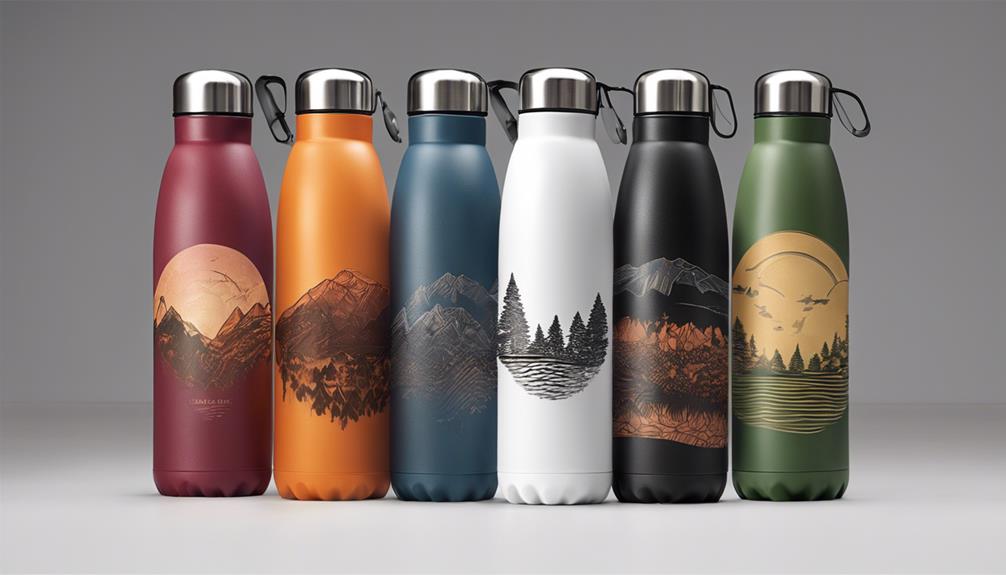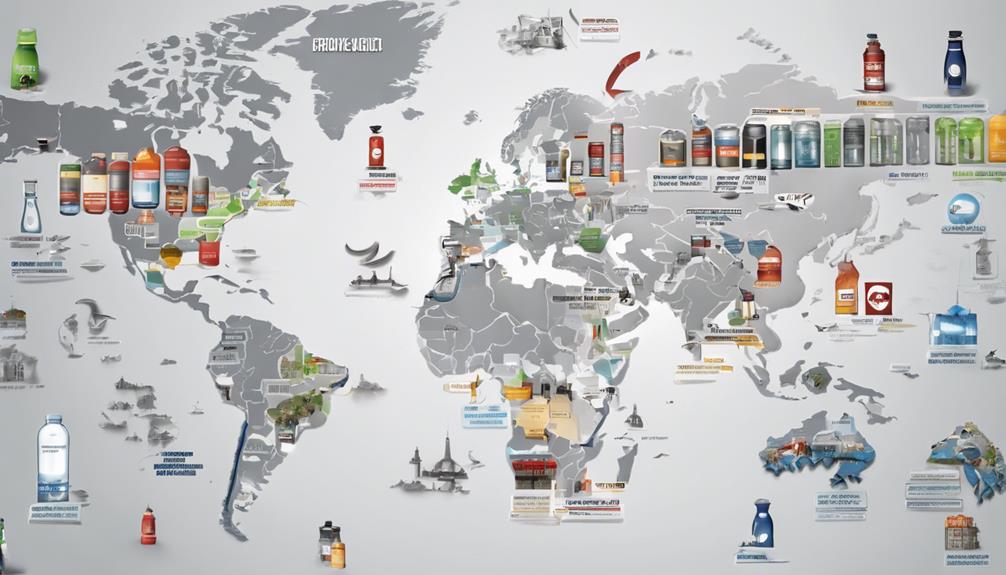In the global market for stainless steel water bottle manufacturing, increased production capacity is fueling growth. Industry trends are shifting towards eco-friendly options, embracing quality and sustainability to meet consumer preferences. The surge in consumer awareness is driving demand, with a focus on material durability and customization. Companies are adapting to stay competitive by reducing their carbon footprint and implementing recycling programs. Sustainable practices and technological advancements are minimizing environmental impact and driving efficiency. Key players are innovating within the industry landscape. To gain deeper insights into this evolving market, explore trends in consumer demand, sustainability initiatives, industry challenges, and future growth prospects.
Key Takeaways
- Increased global demand for stainless steel water bottles.
- Emphasis on sustainable production methods.
- Technological advancements improving manufacturing efficiency.
- Competition driving innovation in design and quality.
- Growth potential in emerging markets for eco-friendly products.
Market Overview
In the market overview of stainless steel water bottle manufacturing, demand has experienced steady growth due to increasing consumer awareness of sustainability and durability. Globally, the market size for stainless steel water bottles has seen significant expansion, with a rise in production capacity to meet the escalating demand. Industry trends indicate a shift towards more environmentally friendly alternatives, propelling the market forward.
The global distribution of stainless steel water bottle manufacturing showcases a widespread presence, with manufacturers located across various regions to cater to local demands. The market size has witnessed a substantial increase in recent years, driven by a surge in consumer preference for reusable and eco-friendly products.
Moreover, production capacity within the stainless steel water bottle manufacturing sector has been on the rise, indicating a positive outlook for the industry. Industry trends suggest a focus on innovation, quality, and sustainability, aligning with consumer preferences for long-lasting and environmentally conscious products.
Consumer Demand Trends

The surge in consumer awareness of sustainability and durability has significantly influenced the demand trends in the stainless steel water bottle manufacturing industry. Consumers are now seeking products that not only meet their hydration needs but also align with their values of reducing waste and supporting long-lasting solutions. This shift in consumer preferences has led manufacturers to focus on enhancing production efficiency and design aesthetics to cater to these evolving demands effectively.
| Production Efficiency | Design Aesthetics | Customization Options |
|---|---|---|
| Implementing advanced manufacturing processes to streamline production. | Incorporating sleek and stylish designs to appeal to modern consumers. | Offering personalized engraving or color options to create unique bottles. |
Moreover, customization options have become a significant factor in consumer decision-making, as individuals seek bottles that reflect their personality and style. Material durability is another key aspect that consumers prioritize, driving manufacturers to invest in high-quality stainless steel that ensures long-term use and minimizes environmental impact. As consumer demand continues to shape the industry landscape, companies must adapt by focusing on these critical factors to stay competitive and meet the evolving needs of the market.
Sustainability Initiatives
You can observe a growing trend in stainless steel water bottle manufacturing towards eco-friendly material choices.
Companies are actively working to reduce their carbon footprint through sustainable production practices.
Implementing recycling programs has become a standard initiative within the industry to promote environmental responsibility.
Eco-Friendly Material Choices
Using eco-friendly material choices in stainless steel water bottle manufacturing is crucial for sustainability initiatives in reducing environmental impact. Opting for materials known for their durability and eco-friendly benefits, such as recycled stainless steel or BPA-free plastics, can significantly decrease the carbon footprint of the production process. These materials not only contribute to a more sustainable manufacturing process but also enhance the overall quality and longevity of the water bottles.
In addition to the environmental advantages, choosing eco-friendly materials can also positively impact consumer appeal. Consumers are increasingly drawn to products that are sustainable and environmentally friendly. By incorporating materials that align with eco-conscious values, manufacturers can attract a broader consumer base and differentiate themselves in the competitive market.
Moreover, the design aesthetics of stainless steel water bottles can be enhanced by using eco-friendly materials, creating visually appealing products that resonate with environmentally conscious consumers. Ultimately, selecting eco-friendly materials for stainless steel water bottle production is a strategic decision that benefits both the environment and the brand's market positioning.
Carbon Footprint Reduction
Carbon footprint reduction in stainless steel water bottle manufacturing involves implementing sustainable practices and materials to minimize environmental impact. By utilizing reusable solutions in the production process, manufacturers can significantly decrease their carbon footprint.
For instance, incorporating energy-efficient manufacturing techniques and utilizing renewable energy sources can reduce the overall environmental impact of stainless steel water bottle production. Additionally, implementing eco-friendly packaging materials and optimizing transportation logistics can further contribute to carbon footprint reduction.
Choosing materials with lower environmental impact, such as recycled stainless steel and non-toxic coatings, is also crucial in reducing the carbon footprint of stainless steel water bottle manufacturing. These materials not only lessen the environmental impact but also promote sustainability throughout the product lifecycle.
Recycling Programs Implemented
In line with sustainability initiatives, implementing robust recycling programs within stainless steel water bottle manufacturing plays a pivotal role in reducing waste and promoting environmental responsibility.
Recycling incentives are crucial in encouraging consumers to return used bottles for recycling. By offering discounts or other benefits for returned bottles, manufacturers can increase the rate of recycling and decrease the amount of waste sent to landfills.
Waste reduction strategies such as implementing efficient sorting processes at recycling facilities can further enhance the overall recycling efforts. Tracking the recycled content in new stainless steel bottles can also provide transparency and accountability in the recycling process.
Additionally, investing in education and awareness campaigns about the importance of recycling stainless steel water bottles can help instill environmentally conscious behaviors in consumers.
Industry Challenges
Facing a myriad of obstacles, the stainless steel water bottle manufacturing industry grapples with significant challenges that impact production efficiency and overall sustainability. Supply chain disruptions, stemming from global events like the pandemic, natural disasters, or political instability, often lead to delays in raw material procurement, affecting the timely production of stainless steel water bottles. These interruptions can ripple through the entire manufacturing process, causing bottlenecks and increasing costs.
Labor costs present another major challenge for the industry. As countries implement stricter labor regulations or increase minimum wages, manufacturers face the pressure of balancing fair compensation for workers with maintaining competitive pricing. Additionally, finding skilled laborers proficient in the intricate processes involved in stainless steel bottle manufacturing can be a struggle, further exacerbating production challenges.
To navigate these obstacles successfully, industry players must focus on enhancing supply chain resilience, exploring automation to mitigate labor costs, and investing in training programs to develop a skilled workforce capable of meeting the demands of this evolving sector.
Technological Advancements
Amidst the challenges faced by the stainless steel water bottle manufacturing industry, significant advancements in technology have played a pivotal role in revolutionizing production processes and enhancing efficiency. Smart manufacturing techniques, such as the integration of Internet of Things (IoT) devices and automation, have enabled manufacturers to optimize their operations. Through real-time data collection and analysis, smart manufacturing has enhanced decision-making processes and improved overall production efficiency.
Digital transformation has also been a key driver in the technological advancements within the stainless steel water bottle manufacturing sector. By leveraging digital technologies like artificial intelligence and predictive analytics, manufacturers can predict maintenance needs, optimize energy consumption, and streamline the production line.
Furthermore, the implementation of advanced robotics and 3D printing technologies has enabled manufacturers to achieve greater precision and customization in their products. These technological advancements not only increase efficiency but also open up new possibilities for innovation and product development within the stainless steel water bottle manufacturing industry.
Key Players Analysis

When analyzing the key players in the stainless steel water bottle manufacturing industry, it's crucial to examine market share distribution among prominent companies.
Understanding the competitive landscape provides valuable insights into the strategies employed by each player to maintain or improve their market position.
Additionally, focusing on innovation within manufacturing processes can shed light on how these key players differentiate themselves in a crowded market.
Market Share Analysis
Which key players dominate the market share in the stainless steel water bottle manufacturing industry? Let's delve into the market share analysis to identify the top players in this sector.
- Hydro Flask: Known for its innovative designs and high-quality products, Hydro Flask has secured a significant portion of the market share through a combination of superior production costs management and strong brand loyalty.
- Yeti: With a focus on durability and performance, Yeti has captured a notable share of the market, leveraging its brand loyalty among outdoor enthusiasts and effective cost control strategies.
- Klean Kanteen: Emphasizing sustainability and eco-friendly practices, Klean Kanteen has carved out a niche in the market, attracting consumers with its competitive production costs and commitment to quality.
- Thermos: A longstanding player in the industry, Thermos maintains a solid market share by balancing production costs efficiency with a heritage of trust and brand loyalty among consumers.
These key players showcase how a strategic combination of production costs management and brand loyalty can drive success in the stainless steel water bottle manufacturing industry.
Competitive Landscape Overview
Considering the competitive landscape in the stainless steel water bottle manufacturing industry, an in-depth analysis of key players reveals crucial insights into market dynamics and strategic positioning. Pricing strategies play a vital role in the competition among key players. Some companies focus on offering premium pricing to position their products as high-end, while others adopt a more competitive pricing strategy to target a broader market segment. This variation in pricing strategies impacts market share and brand positioning significantly.
Moreover, distribution channels are another key aspect of the competitive landscape. Key players often utilize a mix of distribution channels, including online platforms, retail stores, and partnerships with other brands. The efficiency and reach of these distribution channels can influence a company's market presence and accessibility to consumers. Companies that effectively manage and optimize their distribution channels tend to gain a competitive edge in the market.
Understanding the interplay between pricing strategies and distribution channels is essential for key players in the stainless steel water bottle manufacturing industry to navigate the competitive landscape successfully.
Innovation in Manufacturing
In examining the landscape of key players in the stainless steel water bottle manufacturing industry, a detailed analysis of innovation in manufacturing is imperative for understanding the competitive dynamics and strategic advantages within this sector.
Embracing automation efficiency and integrating smart manufacturing technologies have become essential for companies looking to stay ahead in the market.
Here are key aspects of innovation shaping the manufacturing landscape:
- Automation Efficiency: Implementing robotic systems and AI-driven processes to streamline production and enhance overall efficiency.
- Smart Manufacturing Technologies: Utilizing IoT devices, data analytics, and cloud computing to optimize operations and improve decision-making.
- Customization Capabilities: Offering personalized design options through advanced manufacturing techniques to meet diverse consumer preferences.
- Sustainable Practices: Incorporating eco-friendly materials and energy-efficient processes to align with growing environmental concerns and regulations.
Future Growth Prospects
The future growth prospects for the stainless steel water bottle manufacturing industry appear promising, driven by increasing consumer awareness of sustainability and a growing demand for eco-friendly alternatives. Market expansion is expected to be fueled by a shift towards sustainable practices, with consumers preferring reusable and durable products over single-use plastics.
Emerging markets, particularly in developing countries, present untapped opportunities for manufacturers to introduce stainless steel water bottles as eco-conscious choices gain momentum globally.
Furthermore, product innovation and design trends will play a crucial role in driving growth within the industry. Manufacturers are anticipated to focus on developing sleek and functional designs that cater to varying consumer preferences, such as insulated bottles for temperature retention and customizable options for personalization.
Frequently Asked Questions
How Does the Manufacturing Process Impact Water Bottle Quality?
When crafting stainless steel water bottles, the material composition and manufacturing techniques play a crucial role in quality. Rigorous quality control measures and attention to durability factors ensure a superior final product that meets consumer expectations.
What Are the Regulations Regarding Stainless Steel Water Bottle Production?
To ensure regulations compliance and meet industry standards, you must adhere to strict guidelines in stainless steel water bottle production. Understanding these rules is crucial for maintaining quality and safety in the manufacturing process.
Can Stainless Steel Water Bottles Affect Beverage Taste?
Like a clean canvas, stainless steel water bottles preserve beverage taste well, without altering it. The non-reactive material composition ensures no unwanted flavors leach into your drink, maintaining purity and freshness.
Are There Any Health Concerns Associated With Using These Bottles?
When using stainless steel water bottles, ensure they are made of food-grade material to avoid potential health concerns. Proper recycling practices are crucial for environmental impact. Increase consumer awareness about material safety and eco-friendly choices.
How Does the Design of Stainless Steel Water Bottles Impact Sales?
When contemplating consumer preferences, the design of stainless steel water bottles significantly impacts sales. Product aesthetics play a crucial role in attracting buyers, fostering brand loyalty, and guiding effective marketing strategies for these eco-friendly containers.
Conclusion
As you look ahead to the future of the global market for stainless steel water bottle manufacturing, remember that sustainability initiatives and technological advancements will continue to drive growth.
With key players leading the way, the industry is poised for continued success.
So, grab your stainless steel water bottle, filled with refreshing, eco-friendly hydration, and join the movement towards a more sustainable future.

